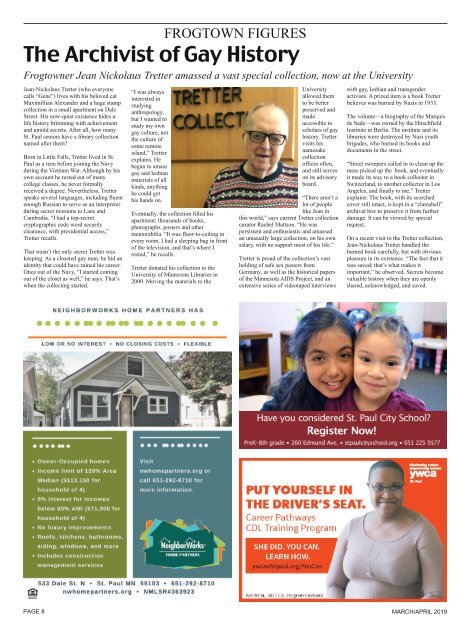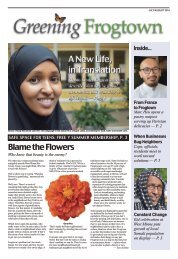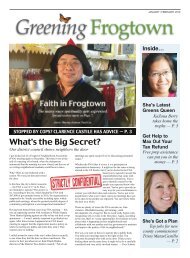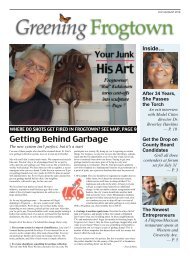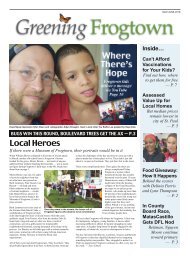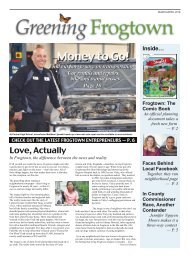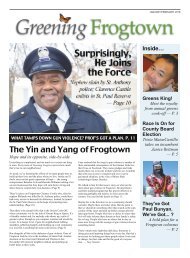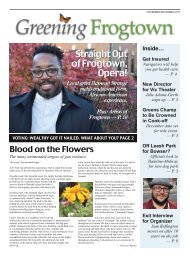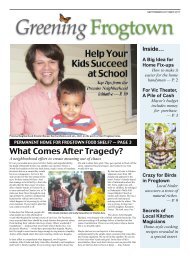Create successful ePaper yourself
Turn your PDF publications into a flip-book with our unique Google optimized e-Paper software.
FROGTOWN FIGURES<br />
The Archivist of Gay History<br />
Frogtowner Jean Nickolaus Tretter amassed a vast special collection, now at the University<br />
Jean-Nickolaus Tretter (who everyone<br />
calls “Gene”) lives with his beloved cat<br />
Maximillian Alexander and a huge stamp<br />
collection in a small apartment on Dale<br />
Street. His now-quiet existence hides a<br />
life history brimming with achievement<br />
and untold secrets. After all, how many<br />
St. Paul seniors have a library collection<br />
named after them?<br />
Born in Little Falls, Tretter lived in St.<br />
Paul as a teen before joining the Navy<br />
during the Vietnam War. Although by his<br />
own account he tested out of many<br />
college classes, he never formally<br />
received a degree. Nevertheless, Tretter<br />
speaks several languages, including fluent<br />
enough Russian to serve as an interpreter<br />
during secret missions to Laos and<br />
Cambodia. “I had a top-secret<br />
cryptographic code word security<br />
clearance, with presidential access,”<br />
Tretter recalls.<br />
That wasn’t the only secret Tretter was<br />
keeping. As a closeted gay man, he hid an<br />
identity that could have ruined his career.<br />
Once out of the Navy, “I started coming<br />
out of the closet as well,” he says. That’s<br />
when the collecting started.<br />
“I was always<br />
interested in<br />
studying<br />
anthropology,<br />
but I wanted to<br />
study my own<br />
gay culture, not<br />
the culture of<br />
some remote<br />
island,” Tretter<br />
explains. He<br />
began to amass<br />
gay and lesbian<br />
materials of all<br />
kinds, anything<br />
he could get<br />
his hands on.<br />
Eventually, the collection filled his<br />
apartment; thousands of books,<br />
photographs, posters and other<br />
memorabilia. “It was floor-to-ceiling in<br />
every room. I had a sleeping bag in front<br />
of the television, and that’s where I<br />
rested,” he recalls.<br />
Tretter donated his collection to the<br />
University of Minnesota Libraries in<br />
2000. Moving the materials to the<br />
University<br />
allowed them<br />
to be better<br />
preserved and<br />
made<br />
accessible to<br />
scholars of gay<br />
history. Tretter<br />
visits his<br />
namesake<br />
collection<br />
offices often,<br />
and still serves<br />
on its advisory<br />
board.<br />
“There aren’t a<br />
lot of people<br />
like Jean in<br />
this world,” says current Tretter collection<br />
curator Rachel Mattson. “He was<br />
persistent and enthusiastic and amassed<br />
an unusually large collection, on his own<br />
salary, with no support most of his life.”<br />
Tretter is proud of the collection’s vast<br />
holding of safe sex posters from<br />
Germany, as well as the historical papers<br />
of the Minnesota AIDS Project, and an<br />
extensive series of videotaped interviews<br />
with gay, lesbian and transgender<br />
activists. A prized item is a book Tretter<br />
believes was burned by Nazis in 1 933.<br />
The volume—a biography of the Marquis<br />
de Sade—was owned by the Hirschfield<br />
Institute in Berlin. The institute and its<br />
libraries were destroyed by Nazi youth<br />
brigades, who burned its books and<br />
documents in the street.<br />
“Street sweepers called in to clean up the<br />
mess picked up the book, and eventually<br />
it made its way to a book collector in<br />
Switzerland, to another collector in Los<br />
Angeles, and finally to me,” Tretter<br />
explains. The book, with its scorched<br />
cover still intact, is kept in a “clamshell”<br />
archival box to preserve it from further<br />
damage. It can be viewed by special<br />
request.<br />
On a recent visit to the Tretter collection,<br />
Jean-Nickolaus Tretter handled the<br />
burned book carefully, but with obvious<br />
pleasure in its existence. “The fact that it<br />
was saved; that’s what makes it<br />
important,” he observed. Secrets become<br />
valuable history when they are openly<br />
shared, acknowledged, and saved.<br />
PAGE 8 MARCH/APRIL 2019


